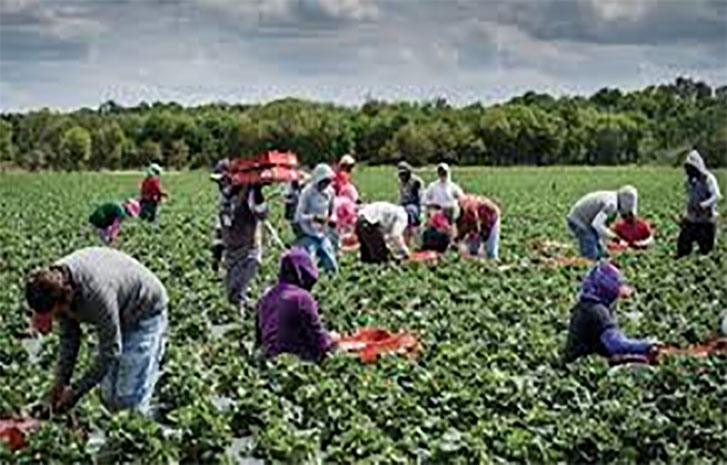Agribusiness
North/East stakeholders map out strategies for avoiding food crisis
Published
4 years agoon
By
Olu Emmanuel
Some agricultural stakeholders in the North – East have prescribed strategies for salvaging the impending food crisis in the country.
In Adamawa State, Mr Suleiman Amusa, Silos Manager, National Food Control Services and Security in charge of the state, said government had rehabilitated the 500,000 metric tonnes silos in Yola.
Amusa said the government had also mopped up excess grains and stored them in the silos which he noted had been operating maximally.
“The silos in Yola are in good condition and the grains stored there is meant for consumption in case of food shortage.
“The facility is among the few and the best in West Africa that has modern and computerised equipment for storing grains.
“Presently, varieties of grains preserved at the facility are meant for national food security and control and not for sale,” he said.
Also, Dr Obadiah Noah, Director, Federal Ministry of Agriculture and Rural Development in Adamawa, said the Federal Government had adopted practical measures to stimulate implementation of the National Food Security Policy.
Noah said the policy focused on promoting sustainable development in agriculture through various interventions among which was the Anchor Borrowers’ Programme (ABP).
He said ABP was being implemented by the Central Bank of Nigeria, Bank of Agriculture, state governments and consortium of commercial banks.
The UN Resident Humanitarian Coordinator to Nigeria, Mr Edward Kallon, said humanitarian actors in the country needed about 250 million dollars to address impending food crisis.
Kallon noted that the food crisis was kick started by decade-long insurgency in Borno, Adamawa, Yobe States.
The coordinator said that millions of people were at risk of starvation occasioned by food shortage.
“Some 775,000 people are at extreme risk of catastrophic food insecurity—the worst outlook in four years.
“The humanitarian community, the UN and non-governmental organisations have joined efforts to address the rapidly deteriorating food insecurity situation in the North – East, working closely with the Government of Nigeria at federal and state levels.
“The humanitarian community is deeply concerned by the alarming food insecurity in North-East Nigeria.
“Levels of food insecurity today are similar to 2016-17, when the crisis was at its worst.
“The UN and its non-governmental partners are working with the government to respond to this growing threat of food insecurity,” Kallon disclosed.
The Borno State Governor, Prof. Babagana Zulum, said food crisis was the worst thing that could happen to a people.
To address the problem, Zulum said that his administration encouraged resettled communities to engage in crop cultivation to reduce reliance on food aid.
He said the state government also developed a 25-year Development Plan and 10-year Strategic Transformation Plan with agriculture as one of the key areas.
According to Zulum, with 72,600 square kilometres of land area, Borno is endowed with great potential for agriculture including the production of livestock, fisheries and poultry.
The governor said that significant investment was made on procurement of equipment to herald agricultural mechanisation and enhance farmer support services in the state.
On his part, Alhaji Idris Yau-Maiunguwa, Chairman, All Farmers Association in Nigeria, Jigawa State chapter, advocated the review of the Federal Government Silos Concession Policy to encourage agricultural production and processing.
Yau-Maiunguwa urged the Jigawa government to take over the 25,000 metric tonnes silos in Jahun Local Government Area of the state.
He recalled that the Federal Government leased the facility to concessionaires in 2019 under the Public Private Partnership, lamenting the silos had not been put to good use.
“It is desirable for the government to take over the facility from individuals or private firms, to ensure effective utilisation of the facility by preparing to mop up excess grains during the 2021 harvest.
“Taking over of the facility is critical to avert envisaged food crisis due to flooding that may prevent bumper harvest,” Yau-Maiunguwa said.
Meanwhile, Mr. Mohammed Alkali, a lecturer with the College of Agriculture, Gujiba, Yobe, has expressed concern over the non-completion of the 25,000 metric tonnest silos project in Damaturu, the state capital.
Alkali said the non-completion of the silos showed the ill-preparedness of government to tackle the imminent food crisis in the North – East region.
He said that development of mechanised agriculture was imperative towards providing durable solution to food crisis, adding that peasant farming would no longer sustain the growing population in the country.
Alkali listed other problems of agriculture in the state to include inadequate fertiliser as well as lack of improved seeds and pesticides at subsidized rates.
“When the government provides farm inputs to farmers, wrong targeting of beneficiaries becomes another problem.
“Housewives, politicians and other highly placed individuals that have no links with farming benefit from the inputs as against the genuine farmers.
“If corruption is not tackled, farmers will suffer and food crisis will continue to threaten the country,” he said.
The lecturer urged governments to always appoint credible people to head agriculture agencies, adding that effective and affordable tractor hiring scheme must also be introduced.
Speaking in the same vein, Alhaji Usman Ciromari, Director, Federal Ministry of Agriculture and Rural Development, Damaturu Office, said the silos project had not been completed.
Ciromari said the steel silos, built on a 2.98 hectares of land at Gujiba road, had reached 98 per cent completion stage.
Also, Dr Mohammed Musa, Director Federal Ministry of Agriculture and Rural Development, in Gombe State, stressed the need for revamping irrigation activities to achieve self sufficiency in food production.
According to Musa, irrigation farming in Nigeria accounts for about three per cent of agricultural practices, which he says is grossly inadequate in spite of the abundant land and water resources.
“Egypt used to be the number one rice producing nation in Africa and 99 per cent of its production is through irrigated agriculture from River Nile.
“When irrigation agriculture is encouraged and supported, it can feed the whole nation with grains such as rice, maize, sorghum, millet and we will still export to other nations to earn foreign exchange,” he said.
Musa also said strengthening of the extension services would enable farmers to adopt modern practices for higher productivity.
According to him, the estimated annual food reserve Nigeria needs to survive major food crisis is 7 million metric tonnes of rice; 12 million of maize, 7 to 9 million of sorghum and 700,000 metric tonnes of beef.
Dr Ephiraim Kafinrabo, Department of Agriculture Extension and Management, College of Agriculture, Bauchi, called for the adoption of sound policies and programmes to reduce prices of farm input such as fertiliser, chemicals and farming implements.
Kafinrabo identified lack of farmers’s access to inputs and financing as militating against productivity and sustainable development in agriculture.
“It is good for the government to subsidise farm inputs and make sure they get to real farmers in rural areas. This will help in tackling food crisis.
“There is also a need for the establishment of warehouses close to the farmers for storage and easy access of the inputs.
“Government should also embark on construction of rural access roads that links the urban towns to ease transportation of farm produce to the market,” he said.
For Mrs Marka Abbas and Mrs Tabawa Atiku, two female stakeholders, empowering women farmers would encourage productivity to avert the looming food crisis.
Abbas said that governments at all levels needed to subsidise the farm inputs for women who were largely into farming at the grassroots.
“Women should be granted credit facilities, inputs, early maturing livestock, improved seeds, seeds and fertilisers.
“When you provide support to smallholder farmers especially women, they will work towards increasing food production,” she said.
Atiku, in her own contribution stressed the need for the training of women farmers to enable them acquire relevant skills so as to increase their production capacity.
Trending

 Health1 week ago
Health1 week agoRacketeering allegations trail claims of vaccine profit cycle

 Business1 week ago
Business1 week agoNaira gains against Euro as strong reserves, trade surplus bolster currency outlook

 Latest1 week ago
Latest1 week agoAPC reshuffles convention committee, drops Uzodinma as Chairman, appoints Masari

 Football7 days ago
Football7 days agoBarcelona moves to secure Rashford permanently, target Romero

 Health6 days ago
Health6 days agoSinger’s death sparks doctor’s takedown of snakebite myths, exposes public health gaps

 Latest1 week ago
Latest1 week agoPDP leadership crisis deepens as Turaki-led NWC faults INEC over meeting with Wike-aligned faction

 Crime6 days ago
Crime6 days agoGunmen kill Anambra community leader in suspected cult revenge attack

 Latest1 week ago
Latest1 week ago2027 elections: INEC calls for massive security mobilisation as electoral activities intensify

